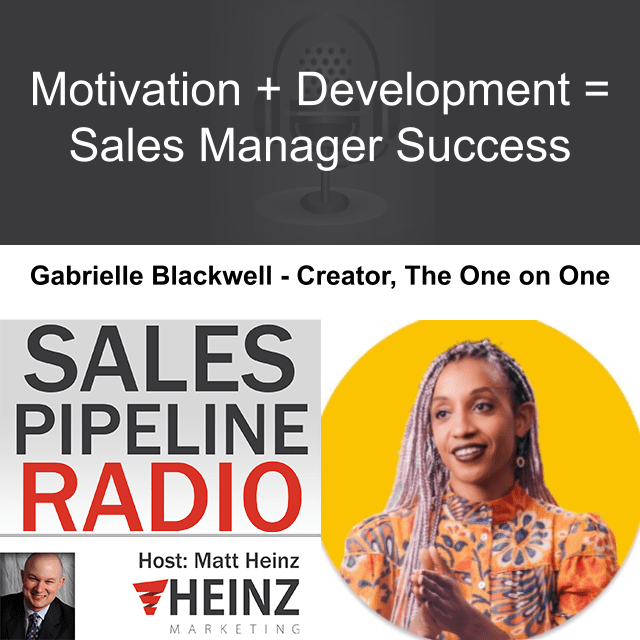Sales Pipeline Radio, Episode 345: Q & A with Dennis Roman

Summary
Matt interviews the best and brightest minds in sales and Marketing on Sales Pipeline Radio. This time learn from Dennis Roman, Founder of Romans Numbers.
By Matt Heinz, President of Heinz Marketing
If you’re not already subscribed to Sales Pipeline Radio or listening live Thursdays at 11:30 am PT on LinkedIn (also on demand) you can find the transcription and recording here on the blog every Monday morning. The show is less than 30 minutes, fast-paced and full of actionable advice, best practices and more for B2B sales and marketing professionals.
We cover a wide range of topics, with a focus on sales development and inside sales priorities. You can subscribe right at Sales Pipeline Radio and/or listen to full recordings of past shows everywhere you listen to podcasts! Spotify, iTunes, Blubrry, Google Play, iHeartRADIO, Stitcher and now on Amazon music. You can even ask Siri, Alexa and Google or search on Audible!
This week’s show is entitled, “Not enough Leads? Try CA2 – Change Your Arguments/Change Your Audience” and my guest is Dennis Roman, Founder at Romans Numbers.
Tune in to:
- Explore the untapped potential of regulated public domain data and discover how it can supercharge your sales efforts.
- Learn the crucial role of financial literacy in sales and how it can help you engage effectively with C-suite executives on financial metrics.
- Gain a competitive advantage in Sales and the strategies that can set you apart from the crowd.
Watch the video, listen in below and/or read the transcript below.
Matt: All right. Welcome everyone to another episode of Sales Pipeline Radio. My name is Matt Heinz. I am your host. Thank you so much everyone for being here. If you are here live, joining Sales Pipeline Radio in the middle of your workday, middle of your work week. Thank you for making us a priority. Excited to have you here.
We’re on episode, something like 365, Dennis, we’ve been doing this for a long time. And every episode of Sales Pipeline Radio past, present, future, always available for download immediately at www.salespipelineradio.com. Very excited, Dennis, to have you on the show today. Got to meet you through the CMO coffee talk community.
And, you know, we’re going to get right into it. Cause I want people to understand where we are missing intent signals, where we are missing clear buying signals from companies. And this information is not only easy to find it is right there in front of our faces. Give people a sense of what we’re talking about and how you came up with this.
Roman: Thank you, Matt. Boy, this is just delightful to be on your show today. It’s very kind of you to invite me. And I’ll be glad to quickly cover how I did come up with this concept. It just came to me, but it came to me after years of work. Not that I was working on the concept. So I have a few premises to my business model or why I’m doing it with this approach. First one is I can’t imagine anybody would argue with this. There’s basically too many vendors chasing too few buyers. I get that that’s not really groundbreaking. However, it’s a fact of life and because there’s so many vendor equivalent offerings in the market, it’s hard to differentiate them. The vendors struggle to do that because the other vendor down the street’s got another one similar. And how do we know the other one down the street? Because when one salesperson leaves one company they often goes to work at the competing company and start selling .
The third one is that tech technology company sales teams– and that’s my primary audience. Technology company sales teams are much more comfortable talking to their counterparts at their target companies. Translation, they’re real cool with the CIO’s organization, but they’re less comfortable, unfortunately, with the business side.
Again, this is not groundbreaking, but if those are the givens in the equation, is there a way through this mess, if you will, this complicated environment? And so the fourth, one is the one that you just touched on and I’ll use these words very precisely. The regulated public domain is rife with data and information just waiting to be crafted into actionable intelligence.
As a matter of fact, there’s too much data, but the emphasis there is, it’s the regulated public domain. Why? Because it is regulated and yes, financial services, probably more regulated than anybody and maybe utilities, et cetera, but they’re all regulated because everybody’s conditioned to use generally accepted accounting principles.
And those accounting principles are true all over the world. So it’s South Africa, France, Japan, China, India, United States. Doesn’t matter. They’re all using the same generally accepted accounting principles and all of them show up in the Trinity of financial reports, income statements, cash flow, balance sheet.
That’s where they all show up. There’s some fudging on the edges. I get that. But by and large. The information is laying out there for sales teams to be accessing if they know how to go about it.
Matt: You mentioned this regulated public domain and the information available, like, why is it not being leveraged today? Is it because there’s so much, because it’s too hard to get through? I mean, this is publicly available data. So you would think it’d be easily indexed, but I don’t see a lot of companies thinking about and prioritizing buying signals and intent signals from this information, why is that gap there?
Roman: That a fact. So here’s a good way to test this theory on our audience today. How many of the folks that are on our call today actually are buying stock, say, two trades a month? And I would say practically probably nobody. Why? They stuck it in their 401K or whatever. They stuck it into a mutual fund because they can’t deal with it.
It’s just the cornucopia, cornucopia is the nice word. It’s just a firehose coming out, and that’s if they wanted to buy stock. Right. So if they won’t even do it to make money, literally make money, they’re not going to do it to figure out how it plays into the public companies they’re going after. And a good example is just the income statement.
This is like looking at the US tax code, you hold your fingers up and you go, no, you know, like Dracula, you just don’t want any part of this. But if you look at an income statement, there’s really basically 3 numbers that matter revenue costs and earnings, you know, that’s it. You could disregard almost everything else.
Everything else has a point. But it’s those three basic numbers, but no one’s ever told anybody this. They say, here’s an income statement. You deal with it as opposed to here’s an income statement. Look at these three things and figure out what direction they’re going.
Matt: So help us lay in the plane a little bit. Let’s say I’m selling a tech solution. I’m selling into enterprise, like publicly traded companies. So the information’s out there, what should I be looking for? Give an example of something that is clearly publicly available. And help people understand what does that imply? What information you’re looking for? What does that imply? And how does that help someone prioritize who they should be going after.
Roman: All right. Great question. So let’s assume we have sales managers on our call today and they have a team of salespeople working for them. So I would encourage our sales managers to say to each of their sales teams, okay, show me the breadcrumbs that you’re following in order to be successful.
And if the breadcrumbs, for instance, don’t begin with the CEO’s letter to the shareholder, just if it ain’t beginning there, we’ve already left 3 of the cars at the station. The CEO of the shareholders letter is telling the priorities that the company has. And yeah, there’s a lot of gerunds and participles.
All you want is the nouns and the verbs. That’s all you really care about, right? All those other things are accoutrements. You don’t need that stuff. So find out what the guy is saying and why do you want to listen to him? Why A, public companies are measured by what? They’re measured by stock performance.
That’s what the shareholders care about. There’s other people who have stakes in public companies who may care about other things that are legitimate– environment, diversity, other things, but shareholders primarily care about the performance of the stock price. Now, let me tie it together with the next one.
What is the C suite rewarded by? Their bonuses are predicated on the growth in revenue and earnings per share. So you have the CEO giving the letter to shareholders and shareholders want to hear about earnings, performance of the stock price. So that CEO is telling them in the letter what I’m going to do to make you happy because you’re our primary constituent .
And then you realize the guy who’s speaking or the gal who’s speaking as the CEO of the company is rewarded on their bonus which tends to be most of their money that they make is built on the Increase in the revenue and in the earnings per share if you will, so there’s two breadcrumbs right at the beginning .
If you’re not starting there, you’re just leaving money on the table because once you get those things riveted, no matter what buyer you’re trying to reach at the public company, no matter what level they’re at, you can say to them, hey, how does what you and I are talking about relate to those two things?
The buyer, in my opinion, will, will befriend you because you’re empowering them how to, how to move up the chain of command at the company that they’re in. ’cause if that person’s not sensitive to all of this by you helping them to realize that those are the things that are driving this company, not withstanding whether mortgage rates go up or down. So there’s two of the breadcrumbs right there and there’s a whole lot of breadcrumbs and what one needs is a pilot, a guide.
Matt: Well, let’s not give too much away because we want to make sure people are hiring you for some of that. We’re talking today on Sales Pipeline Radio with Dennis Roman, he is the founder of Romans Numbers, and I’ve just been fascinated just the more I get to talk to you about like what this plain clear numbers and what it implies.
Okay. But here’s my next question. And this is probably why the workshops are so popular and successful. How many people that are selling technology solutions? How many professional sellers are financially literate at this level, right? How many of them know what’s on a balance sheet, know what’s on an income statement, and talk a little about the importance of financial literacy as credibility to even have these conversations with the C-Suite.
Roman: When I do the workshops, one of the things I tell them is, let’s take an income statement, break it down in your personal life. Your revenue on your income statement is the money you make at work. It’s your salary. It’s your payroll. It’s the money that’s revenue. And your, and your costs are, what do you pay for the car, the house, the dentist, the pool in the backyard, whatever, those are your costs. And what’s down at the bottom, your earnings. Are what you got left over either for disposable reasons or to save, we hope– okay. And they go up. Now I understand an income statement because somebody’s just converted into their real-life experience and that’s what an income statement is for a corporation and you need to be we need to be as comfortable looking at the income statement of the company we’re calling upon in those terms and just get comfortable with it because it’s no more complicated than that. It’s no more complicated than that.
As a matter of fact, in the workshop, I tell my classes, look, your first slide should be, Hey, I’m from company X. I shouldn’t say that because there now is a company X, but I’m from company X and I’m wonderful. Okay. What’s your next slide? The next slide. Watch this, Matt. Watch this. Should be the income statement of the company you’re calling upon.
Put their income statement in front of them. Why would you do that? One, no one, no one has ever done that before, right? Right. They’re going, who the hell are these guys? Who are these people putting my income? And you just say to them, look, we’re not here to sell you stuff. We’re here to help you with your revenue or your costs or your earnings per share.
You will have already moved yourself from fighting with the other 10 vendors who are talking to the CIO over to the business side of the environment. Change your arguments, you’ll change your audience. When I, when I delivered a large class for, I had 60 people in it at a big tech company, and I was asked to do it to the research and development department at this big tech company.
Now, the research and development part department has 60 MBAs working in it. And when the guy asked me to do this, I said, why are you asking me to do this? You have 60 MBAs working for you. What do you want me to tell him? He said, Dennis, I’ve seen your workshop. Just tell him and I told him and the people at the end of it went.
Why didn’t anybody ever tell us this before? And I’m going, what were you doing in cold data? What, what were you doing? And what, what were you doing when you were getting your MBA? Didn’t you understand that this is what that means? And the answer was no. And of course, the 60 MBAs are not salespeople.
Matt: So your your CA squared, change your arguments, change your audience, I think is really powerful.
There can be a gap, however, between saying, okay. What really matters here, Mr. CXO is earning increasing earnings and shareholder value, right? There’s a big gap or maybe there’s not you tell me between like that outcome and you need to buy this software. We need to buy this marketing tool. You need to like invest in this infrastructure point of sale, yada, yada, whatever.
What are some strategies to bridge that gap to make it clear to the executive that one, that this investment is going to impact these metrics that they really care about?
Roman: Great. All right. So we have another set of baseline points is one, nobody in sales and marketing or their bosses is every, is ever happy at the end of the year.
Everybody is disappointed. Management is disappointed and the people who work for management are disappointed because they had income quota to meet customer count to meet whatever. And they never got there. If they got there, you and I would be out of business, right? If, in fact, these people were successful, they wouldn’t be looking for extra help from other other sources. Okay, so given that everybody should be hungry about what they should be doing to try to pick up another way to get into the environment. Here’s the biggest dread that I think a salesperson might have to get trapped in an elevator on the 14th floor for 10 minutes with the CFO of the company they’re calling on. They’re trapped in the elevator. Now, if this was a movie production, the actress would be delighted to be trapped in the elevator with the director of the movie, but salespeople don’t want to be trapped in an elevator with a CEO who has one set of metrics, a COO who has a different set, and the CFO who has a different set again, because they don’t know how to speak that language.
They don’t know how to make those impressions. Okay. So now we have to bridge this. Historically, the non-success or the frustration by the year end is why? Because the arguments run like this. My solution is terrific. My solution is installed in 27 places. My solution has quality and it has innovation and it has an industry analyst that thinks it’s wonderful.
And all of those things are legitimate, but nobody on the business side cares. Nobody on the business side cares. They want to know how you’re going to impact the cost structure of the environment that they’re operating in or the revenue structure. Here’s a little-known secret. If you look into the financial statements, it’s very easy to find companies that are swimming in cash– swimming, they have so much money, they don’t know what to do with it.
And it’s also a easy to find companies that are going out of business potentially because their business model is shot. Now, you say to a sales team, who would you rather go after people swimming in money or people who are broke? And most of the people are going to say, I’ll go after the people swimming in money.
Okay, fine. Well, what if we could tell you who they were? Well, I can tell them who they were. They could just look it up on the statements and find out who they are. But it’s the field on the statement is not Hey, we’re swimming in money, come on over here. It has a very Latin name that nobody knows, so it’s very difficult to get out of the income statement or the balance sheet or cash flow exactly what I’m talking about unless you have a guide or somebody who’s taught you these things. Not only do those documents say we’re swimming in cash. They have another field that says We have so much cash we’ve under invested it and the shareholders are killing us because we put up a parking lot in New York City as opposed to a skyscraper rental office building. So all of those clues and their clues, they’re not hidden plain view, but you know, all the lawyer shows where they say, what’s plan B? Plan B is flood the other side with 100 boxes of evidence in the discovery phase, because there’s one page in that 100 boxes that matter, and that’s the way the financial statements are. It’s 100 boxes of evidence, but there’s only a few pages in it that matter. If somebody could tell you what those pages are: breadcrumbs breadcrumbs, breadcrumbs. If you get my point.
Matt: We are almost out of time here unfortunately. If you want to check out more from Dennis RomansNumbers.Com, learn more about his business, his workshops. For other people listening to this, that want to generally improve financial literacy to be able to do a little bit of this on their own. What do you recommend? Where should they go? Are their traditional sources, any books? For someone who’s like, I want to learn, but I don’t have a background in this. Where do I start?
Roman: So there’s a lot of books that are in the marketplace. I’m not a big book guy. I’m a big surf guy. I surf a lot of different sources and probably the go-to site for any term that’s related to financial services that you can’t explain to your spouse, you think you know it, but if somebody says it’s called investopedia. Free site, every term you ever wanted to know about anything is explained there.
It’s a wonderful resource. So if you see a term that’s floating by today, use that term and go look it up. It’s like how we increased our vocabulary in grammar school, learn a new word every day or whatever. Look in the dictionary. Same thing. If you pick up a new phrase every day and and become a master it, then in fact, you’re going to be a lot more productive and a lot more comfortable in your own 2 feet as you’re trying to digest the marketplace and figure out how to use that to go after your public companies.
Matt: Dennis, thank you so much for your time today. Thanks for all your insights. Definitely check him out. RomansNumbers.Com. Change your arguments, change your audience. Thanks everyone for joining us today. Here next week as well, 2:30 Eastern 11:30 Pacific.
We’ll see you next week on Sales Pipeline Radio. Take care.
Roman: Bye bye Matt. Thanks so much. Thank you.
Listen to the Latest Episodes:
Matt interviews the best and brightest minds in sales and Marketing. If you would like to be a guest on Sales Pipeline Radio send an email to Sheena@heinzmarketing.com.



